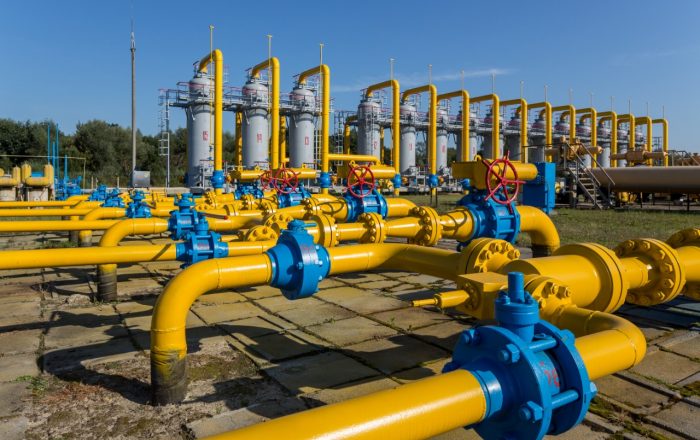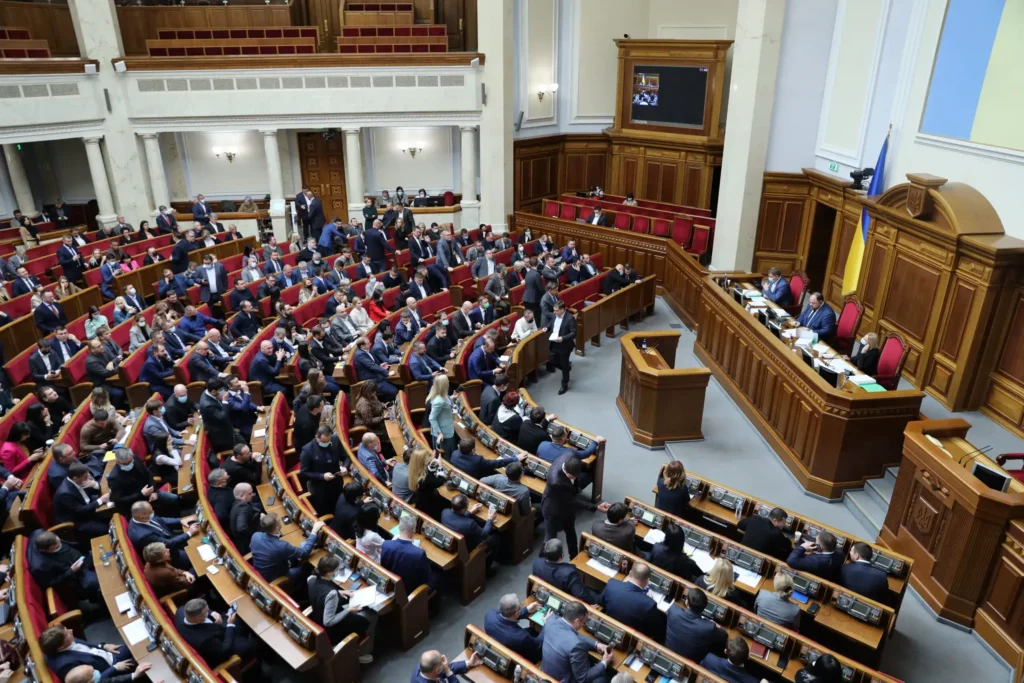Russian gas out: Will Ukraine remain a transit country after 2024?
12 July 2024 12:55
At the end of this year, a five-year contract for the transit of Russian gas through Ukraine to the EU will expire. To prevent Russia from making money on Ukrainian transit, our country has decided not to extend the agreement further. This was stated by Volodymyr Zelenskyy in an interview with Bloomberg.
“We do not want to extend the gas contract with the Russian Federation. We don’t want them to make money here,” he said,
– he said.
Indeed, in just 2 years of the full-scale invasion, the aggressor country has earned more than $10 billion in its coffers. According to Zelenskyy, Ukraine is already negotiating the shipment of gas from Azerbaijan to the European Union through our country. So, what are the forecasts for these negotiations, who else besides Azerbaijan can transport gas through Ukraine, and, ultimately, whether we will remain a transit country in the future – Kommersant Ukrainian
Why Ukraine still transports Russian gas through its territory
Ukraine’s gas transmission system (GTS) is a complex facility and an important part of the former Soviet Union’s Unified Gas Supply System. Natural gas was first discovered in Ukraine in the early 20th century. The first Dashava-Stryi gas pipeline was built at the same time.
Later, in 1948, the Dashava-Kyiv gas pipeline was built. This year is generally considered to be the year when Ukraine’s gas transmission system was founded. Later, gas pipelines were built not only across the territory of our country, but also from Ukraine to Russia. Even after the collapse of the Soviet Union, Ukraine continued to be a transit country and developed its GTS, which continued to have close relations with Russia. At the same time, each of the parties received income from the transit of Russian gas through the Ukrainian gas transmission system.
However, the so-called “gas conflicts” between the two countries began almost from the very beginning of Ukraine’s independence: in 1993, Moscow threatened to cut off gas supplies through Ukraine due to payment arrears. The conflict was quickly resolved, but misunderstandings over transit have been ongoing under every president of Ukraine.
However, contracts were signed and gas continued to be transported through Ukraine: the last contract between Naftogaz and Gazprom was signed on 30 December 2019 under the pump or pay scheme for 2020-2024.
Despite the full-scale invasion, the contract was not cancelled. A number of European countries continued to use Russian gas. Among them are Slovakia, Austria, and Hungary. The main reason for this is the cheap price of natural gas, says Benjamin Hilgenstock, a senior economist at the Kyiv School of Economics.
“So, until an embargo on Russian natural gas is imposed, these countries will continue to buy it,” he said,
– he believes.
The embargo has not been imposed yet, but Ukraine’s contract with Russia expires on 30 December, so the transit of Russian gas through our territory is also coming to an end.
Will Russia be able to transport its gas after the contract with Ukraine expires?
During the full-scale invasion, EU countries have significantly reduced their consumption of Russian gas. To cope with the shortage of natural gas from the aggressor country, the EU has built up its own storage reserves, increased imports of liquefied natural gas, mainly from the US, encouraged consumers to reduce consumption and improve the energy efficiency of appliances and buildings, and relied more on renewable energy sources such as wind and solar power.
However, the EU will not be able to completely abandon Russian gas. This is the opinion of Gennadiy Ryabtsev, director of special projects at the Psyche Research and Development Centre. He admits that after the end of the Ukraine-Russia contract, gas will be transported not through Ukraine but through Turkey.
“Russia has the ability to transport gas through the Blue Stream and Turkish Stream, two pipelines that transit from Turkey to Russia. Plus the capabilities of Novatek (a Russian gas company – ed.), which has its own gas liquefaction technology and several gas pipelines through which it transports its gas in liquefied form, including to European countries,” he said,
– he said, noting that in this way Russia would be able to transport at least 30 billion cubic metres of gas per year to European consumers. At present, according to the expert, Russia transports about 50 billion cubic metres of gas per year.
Is it important for Ukraine to maintain gas transit?
According to the President of Ukraine Volodymyr Zelenskyy, Ukraine can continue to remain a transit country even without cooperating with Russia.
“We are now considering alternative steps on how we can use the pipeline with another gas supplier, another country. Negotiations are ongoing,”
– the President said in an interview with Bloomberg.
The same topic is currently being discussed in the Committee on Energy, Housing and Utilities, said Mr Kulinsky in an exclusive commentary .
“The preservation of transit is a rather important issue, and it is being discussed at the committee because Ukraine receives a rather significant amount of money from transit. And in order for our gas pipeline system to continue to serve, it is not Russian gas that should go to Europe, but natural gas from other countries,”
– said the MP.

Indeed, according to experts, if Ukraine does not renegotiate the gas transit contract, it may lose about $800 million a year and its role in the EU energy system. However, according to Mykhailo Gonchar, President of the Centre for Global Studies “Strategy XXI”, an expert on international energy relations and security, money should not influence the renegotiation of contracts.
“Yes, there is never any extra money in the budget, but this transit does not bring us that much money. Also, Gazprom does not fully fulfil its contractual obligations in financial terms. Therefore, if we lose this source of additional revenue, it will not be a disaster for the budget,”
– the expert said.
Can Ukraine remain a transit country without Russia?
Despite the fact that, as stated by the President, Ukraine is currently negotiating with other countries on gas transit, in particular with Azerbaijan, Gennadiy Ryabtsev believes that our country will still not be able to conclude a gas supply contract with other players in the natural gas market.
“I think that no one will be able to sign contracts with Ukraine for gas transmission. It is important to understand that our gas transmission system will no longer be a transit system. It has already been rebuilt over the past five years to meet the needs of Ukrainian consumers. Taking into account these needs, we should not focus on gas transportation now,”
– the expert believes.
According to MP Serhiy Nagornyak, Ukraine needs not only to develop its own production, but also to attract reliable foreign partners to become a “deterrent” to the aggressor country in the future.
“We need to develop our gas fields so that in 5-10 years we can not only transport gas from other countries but also export our own. Also, Ukraine needs to look for reliable foreign partners, who are currently leaders in the global gas production market, to become a deterrent to Russia’s aggression, as Kazakhstan did,”
– explained Nagornyak.
At the same time, the MP believes that Ukraine can still transit gas from countries other than Russia. In particular, negotiations on the transit of Azerbaijani gas have already begun.
Is it possible to transit Azerbaijani gas through Ukraine to the EU?
According to MP Serhiy Nagornyak, Azerbaijan has already expressed a desire to transport gas to Europe through the Ukrainian gas transmission system and is holding talks with the EU and Ukraine on this issue.
“We hope that this issue will be implemented next year, and it will be Azerbaijani gas, not Russian gas, that will go to Europe. Technically, this is possible: many countries have gas transmission systems and pipelines that transport gas, and each country receives money for this transit,” he said,
– he said and stressed that not only Azerbaijan but also Kazakhstan is interested in Ukrainian transit.
“I do not rule out the possibility that Kazakh gas will go to Europe. I am not sure if this will happen next year. But I think that in the near future, if Azerbaijan is the first to initiate such an issue, it is likely that Kazakhstan will follow. It is interested in exporting its products because Kazakhstan’s main buyer is China, which dictates lower prices than Europe,” he said,
– he said.

At the same time, Gennadiy Ryabtsev has a radically different opinion. According to the expert, the current negotiations between Ukraine and Azerbaijan do not indicate the conclusion of terms and conditions, but the possibility of signing them in the future.
“The point is that Azerbaijan is now sending gas to Europe through the TAP TANAP (Trans-Adriatic and Trans-Anatolian Pipeline – ed.) pipeline system. This pipeline system allows Azerbaijan’s gas to supply a small number of Balkan countries with gas: Bulgaria, Romania and others. The idea is to extend the pipe that goes north, to branch off from this TAP TANAP to the territory of Ukraine and to underground gas storage facilities, so that, for example, in summer, more gas can be pumped in and use the underground gas storage facilities of Ukraine to store this gas, including for the needs of European countries,”
– the expert explained.
At the same time, Ryabtsev noted, this is a purely hypothetical option.
“To do this, an interconnector needs to be built, i.e. a pipe that will connect all these countries. And secondly, there is not enough Azerbaijani gas to be directed to Ukraine. That is why the President said that this is one of the proposals, he did not say that any agreement would be signed,”
– emphasised Ryabtsev.
“Pitfalls of a possible contract between Azerbaijan and Ukraine
According to Mykhailo Gonchar, President of the Centre for Global Studies “Strategy XXI”, an expert on international energy relations and security, Russia may be interested in the possible cooperation between Azerbaijan and Ukraine, so the authorities should be more careful about future agreements.
“This could be a ‘schematism’, which is connected with the fact that Gazprom has found a hybrid form of delivering its gas to the European market. For example, there is a trading company that is somehow connected to the state-owned Azerbaijani company Socar, which has a contract with a Hungarian, Slovak or Austrian company. And on the basis of this sales contract, European companies buy gas and the Azerbaijani company sells it. The relevant contracts will be signed for the provision of transport services, for example, through the territory of Russia using Gazprom’s gas pipelines and through the territory of Ukraine in the same way,”
– says the expert.
At this stage, he said, the issue will be about replacing Russian gas, but “technical issues” can always be adjusted.
“The plan is very simple: “suddenly” the demand for Azerbaijani gas in Europe will increase. And Socar has no extra volumes. Then a very simple manoeuvre is made: the Azerbaijani company buys the gas it needs from someone who has an excess of it. And Gazprom has a surplus of gas. And from a formal point of view, you can’t find fault with this, because there is a seller, an Azerbaijani company, a buyer, a European company, or a number of these companies. And Gazprom seems to be completely absent here. But, in fact, Russian gas is actually going to Europe through this channel,”
– mykhailo Gonchar predicted.
He stressed that there is no direct pipeline to supply gas from the South Caucasus to Ukraine. However, an agreement between the countries can be signed in such a way that it is allegedly a transit through Russian territory, which will not physically exist, but will be paid for.
“This is a kind of shadow cash register for cutting in the interests of a certain circle of people, both from the Azerbaijani side and from Gazprom. It is also used to corrupt the relevant officials in those countries where there will be resistance to this scheme. First of all, of course, in Ukraine,”
– the expert concluded.
The journalists asked MP Nagornyak how it is still possible to avoid the so-called “schematosis”, namely a situation where the blue fuel of the aggressor country will be supplied under the conditionally Azerbaijani gas.
“It’s hard for me to say how the verification will technically take place, because you can’t check the gas with your hands to see whose it really is. For us, the most important thing is who the final beneficiary is. One thing is important to us – the less oil and gas dollars Russia receives, the less it will be able to invest in arms production,”
– said Sergiy Nagornyak.
At present, Russian gas continues to be transported through the Ukrainian gas transmission system to the EU until the end of 2024. It is unknown whether Ukraine will sign contracts with other countries for the next year, 2025, and whether it will continue to be a transit country. Kommersant Ukrayinsky









